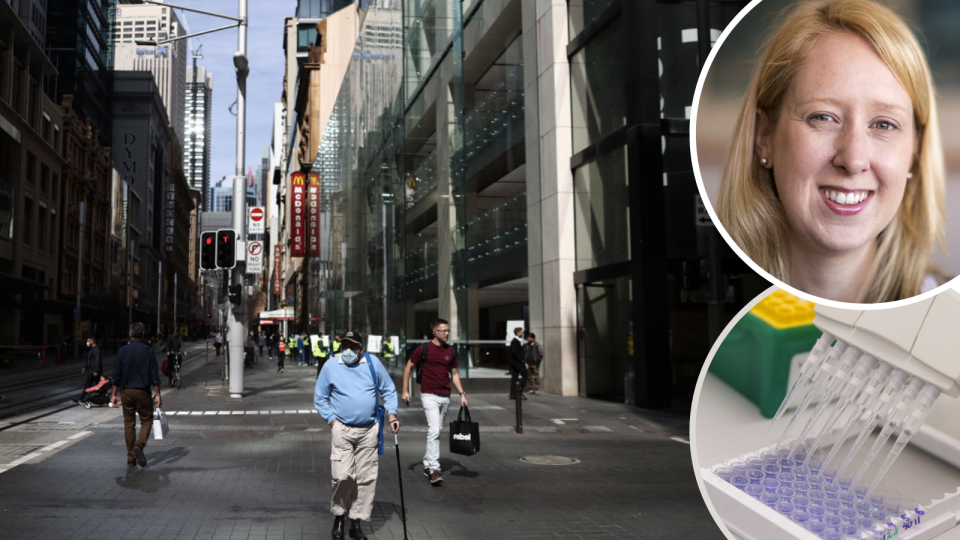‘Reality check’: Why a vaccine won’t fix Australia’s recession

The damage done to Australia’s economy – which is now in an official recession – will not be cured by a vaccine to the virus, according to a health economist, with the economic fall-out to be felt for years to come.
Social distancing rules, travel restrictions, high unemployment and low levels of consumer confidence will stick around, leaving the tourism, university, art and entertainment sectors crippled for a long time yet, said Macquarie University Centre for the Health Economy senior research fellow Bonny Parkinson.
“The vaccine is not going to be the answer to our problems. And it’s not going to be 100 per cent effective,” Parkinson told Yahoo Finance.
“People think the vaccine will come. Everyone will get it, and then we can move on with our lives, and everything will be hunky dory and normal.
“I think there needs to be a reality check – this is not the case.”
Also read: $2,856: The price Aussies will pay without coronavirus vaccine
Also read: $2,300 to Aussies willing to test Covid-19 vaccine
Also read: How much the Covid-19 vaccine will cost Australians
Even if a vaccine were to be discovered today, clinical trials and testing to see how the vaccine would interact with other medication would mean it wouldn’t be available until at least mid-2021.
“I don't think I can say for certain [when recovery is]. We’re looking at a year or more. I just don't see us getting the vaccine in Australia until next year,” said Parkinson.
“And then even then, we really do need a large proportion of the world’s population vaccinated and it's gonna take a long time.”
Vaccine is no ‘silver bullet’
In order for a vaccine to properly work, a number of conditions need to be met, according to the health economist: we need to achieve a high rate of herd immunity, and the virus needs to stop circulating overseas.
But as it stands, there is a low chance of either of those two things, and therefore a high chance travel restrictions will stay, meaning Australia’s economy will continue to be hamstrung.
A vaccine would have to be 80 to 90 per cent effective, otherwise we won’t achieve herd immunity, according to Parkinson.
“[A vaccine] is also more likely to protect against the severity or more severe forms of coronavirus rather than protecting against infection,” she said.
On top of that, not everyone is willing to be vaccinated, she added: research from the University of Sydney and Ipsos has already shown that only 85 to 88 per cent of people have said they would be willing to get the vaccine.
And some may not actually be able to take the vaccine at all, due to other medical conditions.
On top of this, even if all Australians were able to access the vaccine, not everyone in the world will receive it, and this will carry far-reaching consequences for Australia’s economy.
“There’s always going to be that risk where people coming into the country are going to be bringing in the virus with them. We can vaccinate everyone in the world – or we do eventually, but it’s going to take years,” she said.
“So even though these developed countries like the US and UK are competing for these vaccines and getting access to them - a large proportion of the world won't be able to get access, which is a major concern of the World Health Organisation.”
“So that means international visitors aren’t going to come in, students and returning travellers aren’t going to come in.
“The tourism industry is going to continue to struggle. The university sector is not going to be able to get those international students to come in and they can struggle with these limitations for years,” said Parkinson.
And because there will be fewer flights, international flight costs will rise, even if travel becomes possible again.
Social distancing requirements will likely linger, meaning the entertainment, music and arts sector as well as cafes, bars, clubs and restaurants will continue to struggle, she said.
“These industries continue to employ a large proportion of the population. We’re going to still have higher unemployment, which is going to have an impact on the demand for goods and services,” she said.
And even if everyone does get vaccinated, there will always be the threat the virus will come back around.
“[It’s] just like Melbourne or even Brisbane or New Zealand’s experience. They thought they had it under control and then suddenly it’s come back into the community.”
Make your money work with Yahoo Finance’s daily newsletter. Sign up here and stay on top of the latest money, property and economy news.
Follow Yahoo Finance Australia on Facebook, Twitter, Instagram and LinkedIn.

 Yahoo Finance
Yahoo Finance 

